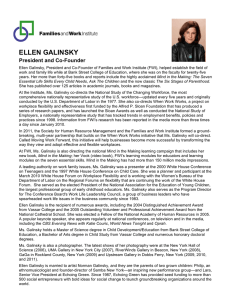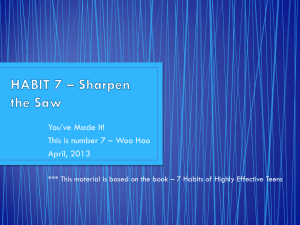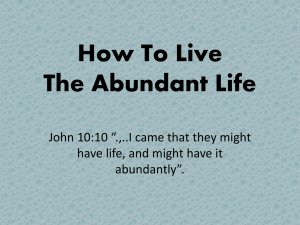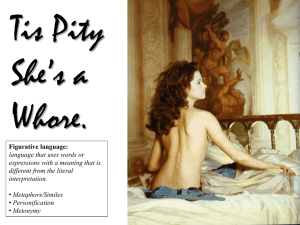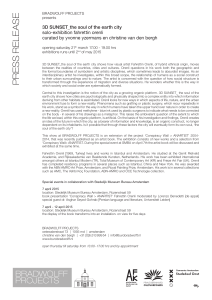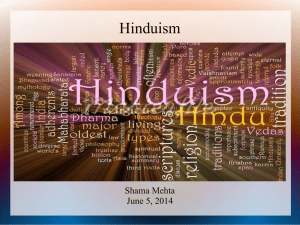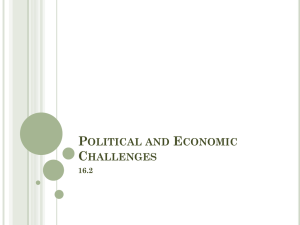Assignment PPT
advertisement
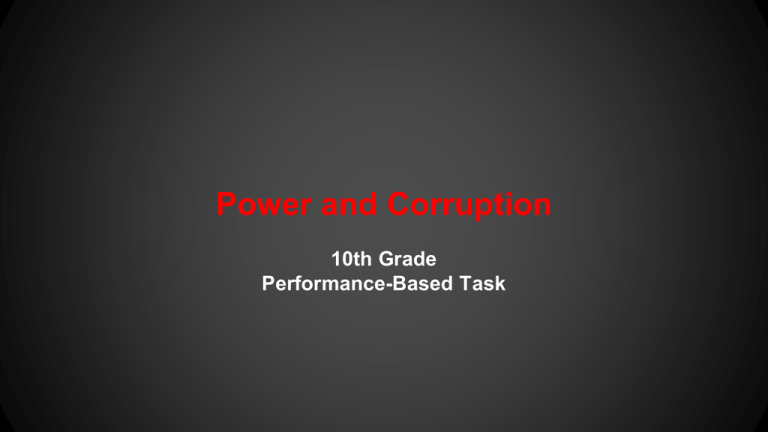
Power and Corruption 10th Grade Performance-Based Task Part 1: You will closely analyze “Why Power Corrupts” by David Bergstein by taking Cornell notes (including writing a summary) and answering five text-dependent questions. Cornell Notes Step 1: Notes Take notes on the text and gather facts about the topic Step 2: Questions Anticipate Quiz questions that would prompt the notes you took. Step 3: Summary Write a summary of the text. Anchor Text “Why Power Corrupts” by: David Bergstein Recent accusations against Chris Christie and members of his staff have many pondering an age-old question: Why does power corrupt? Last July, Eliot Spitzer appeared on "The Tonight Show" and was bluntly asked about his fall from grace by Jay Leno. "How can you be this stupid?" Leno inquired. Spitzer responded, "Hubris is terminal." Via the process of obtaining power, hubris is developed. And once power is realized, it leaves one feeling impervious. This should not be a surprise. If there were no consequences to our actions, the majority of us would do whatever we wanted whenever we wanted, often in complete contradiction with acceptable social norms. Power corrupts because people in positions of power are not often accountable for their actions, and therefore free to behave in excess. This occurs at virtually every level where power is given to one person over another -whether a head of state or virtually anywhere in the long chain of our legal system, starting with attorneys. But what is more noteworthy is the way in which the trajectory required to obtain power affects our most primal instincts. The spiritual aspects of many religions divide man into two parts: The physical (or animal soul), and the nonphysical, typically considered the godly soul. The animal soul, which drives one's physical body or physical existence, is frequently at odds with the godly/altruistic soul -- often portrayed throughout popular culture as the devil on one shoulder and the angel on the other. It's an unfortunate portrayal because the animal instinct is not necessarily evil, but merely focused solely on survival, independent of whether something is right or wrong or whom it may affect -- it is our unconscious response. A lion is not portrayed as evil when it kills another animal for food, or the dominant male takes the spoils of the hunt by ruthlessly applying its physical advantage. But in our world we refer to these acts as corrupt or evil, and we associate negative connotations with such behavior -- because it is often ruthless. Man's survival, however, is far more complex than that of animals, and does require excess -- to plan for himself, his family, the future. The animal soul of man is driven by the same motivators found in the animal kingdom, but we inevitably consider it a dark side. Alternatively, the godly soul is without negative connotations because it does not require food, money or even others' appreciation. It need not accumulate anything. Those godly desires are considered pure. This struggle between the animal and the godly souls is inherent in the path to power given that the ingredients for success require individual acts that most everyone would consider offensive. But these acts, though often ruthless, are necessary in order to succeed. The quest for success and ultimately power is a war, a fight for survival filled with adversity, often spanning years. Those who do find success typically do so by virtue of the animal soul, if for no other reason than because it is absolutely necessary. Robert Greene's book, The 48 Laws of Power, is essentially a consolidation of the classic books on war such as Machiavelli's The Prince and Sun Tsu's The Art of War. It is also used as a textbook for businesses, and includes mantras such as: "Conceal your intentions," "Get others to do the work for you, but Always Take the credit," and "Pose as a Friend, Work as a Spy." These understood and frequently applied rules for obtaining power necessitate that regardless of whether or not one begins down a path toward power with a certain amount of innocence, by repeating these acts they will -- if they are to truly succeed -- unleash their animal soul. Those acts required for obtaining power are, in and of themselves, the type of acts people would categorize as corrupt. Ultimately, for those who do find success and power, their animal soul has become so dominant over time that it becomes the norm. And when one reaches the apex of their respective position -- be it the leader of a nation, the CEO of a business, or head of a religious body -- they have pronounced all the qualities of the animal soul, to the point that it is now completely unopposed by the godly soul. And in such positions of power, with nobody to resist them, they are now in a position which allows for essentially doing whatever, whenever, and without fear of consequence. The animal soul has essentially crushed out the godly soul through the trajectory toward success. That is why power corrupts -because it is the same activity that got you to where you are, but now it is unopposed. And those who can do whatever they want nearly always do whatever they want. Most people who get to positions of power are of this predisposition, with the animal soul occupying the dominant part of their constitution -- so much so that it is second nature to behave as such. There are exceptions, but the vast majority of powerful people falling into the animal category, the potential for corruption is ample. The difference between the minority and the majority can be attributed to one's perception. When one attains success, especially true power, they mostly feel as if they have attained it themselves. Nevertheless, despite what people in power may believe, they did not get to where they are on their own. The truth is that power is given as much as it is taken. In almost all cases, if power is to continue, the people underneath you must have the willingness to allow you to remain in that position. Those who push too far and tip the scales often find that it leads to their demise. This happens with countless leaders. Leaders do not exist on their own accord. They are part of the greater consciousness of human beings, and are ultimately in power because people want them there (or due to a fear of them in some cases). If we look back over history, virtually every leader with which corruption is associated came to power through the military ranks. The military profession is intrinsic to ruthless training, and soldiers therefore favor the animal instinct. Leaders who rise to power through the military system have been in control of the most powerful of channels, not to mention protected by that very body which is structured almost entirely on ruthlessness. Today's private sector equivalent to that military mentality is the legal system, specifically attorneys. The legal profession is the most powerful body within our country, and like the military, oversight is an internal process -- ostensibly overseen by the very individuals responsible for interpreting legislation. While the legal profession is purportedly governed by and accountable to itself, the result is the ability to continually extend attorneys' unchecked reach over our lives -- both civilly and criminally. And as it would be unrealistic to expect one who rose to power through the military to remain humble, how can we expect our current crop of leaders, many of whom are attorneys, to be any different? History is rife with leaders who have failed to recognize this and have allowed their corruption to spiral out of control. The result is always the same -- a stripping of power and a fall from grace. And whether it's Spitzer, Christie, or any of the myriad others, each inevitably forgot that they reached their apex because of the people. Those who recognize that their achievements are due to their own initiatives as well as the help and support of other people are the ones who don't partake in corruption. Corruption is a byproduct of a person in power, either through money, by way of election, or by force, who is arrogant instead of grateful. In the words of Elliot Spitzer, "hubris is terminal. hubris - excessive pride (in a tragedy, it leads to a character’s downfall) impervious – untouchable trajectory -- path of actions altruistic -- working for the good of others inherent – essential apex -- highest point accord – merit intrinsic -- occurring naturally purportedly – supposedly rife -- full of byproduct – result Bergstein, David. “Why Power Corrupts.” Huffington Post 17 Jan. 2014. Updated 18 March 2014. Web. 7 July 2014. Answer the Questions Now that you have had time to analyze the article, answer questions connected to the text. You can answer these questions digitally. I have posted the document on my webpage: Text Dependent Questions. Part 2: Additional Sources Directions: Read the essay prompt on the next slide. Then, read and analyze all of the additional texts by taking notes. In addition to the anchor source, you must include at least two support texts in your essay. Performance-Based Argument Task You have read a variety of sources discussing the relationship between power and corruption. Using what you have learned, support or refute the following statement: “It is said that power corrupts, but actually it's more true that power attracts the corruptible.” -- David Brin Your essay should be well-developed with a clear claim and evidence from the anchor text and at least two additional sources. Avoid merely summarizing the sources. Indicate clearly from which sources you are using, whether through direct quotation, paraphrase, or summary. You may refer to the sources as follows: (Anchor text), (Source A), (Source B), and so on. Additional Source A: “Does Power Corrupt? Absolutely Not” by Kate Pickert Power breeds competence, not corruption, according to a new study in the May issue of Psychological Science. The study, a collaboration between U.S. and Dutch researchers, finds that if people feel powerful in their roles, they may be less likely to make on-the-job errors — like administering the wrong medication to a patient. Contrary to conventional wisdom, the study suggests that people at the bottom of the workplace totem pole don't end up there for lack of ability, but rather that being low and powerless in a hierarchy leads to more mistakes. It's a finding that surprised even the study's authors. "I'll be totally honest. When we started this research," says Adam Galinsky, a co-author and a social psychology professor at the Kellogg School of Management at Northwestern University, "we first had the hypothesis that maybe power might impair [cognitive] functioning." "This research has a lot of direct implications for such things as whether power corrupts," says Galinsky, who collaborated with researchers from VU University Amsterdam and Radboud University Nijmegan. Here's how the study worked: volunteers, Dutch university students, were randomly assigned to one of three experimental groups. Researchers "primed" each group at the outset — using a variety of psychological devices — to feel powerful, powerless or neutral. In one priming exercise, students were asked to form sentences using specific groups of words. The powerful group got words that implied high power, like "authority" or "dominate." The powerless group were given words such as "subordinate" and "obey." The control group got power-neutral words. After completing the word tasks, participants were tested for what Galinsky refers to as "executive function" — the ability to pay attention to relevant information while ignoring irrelevant information, and completing tasks based on the relevant information. Researchers employed several different tests of executive function, the best-known among them being the Stroop test, a measure of cognitive attention developed in the 1930s: participants are shown color words, such as "red," "blue" or "yellow," printed in colors that are different from the color that the word actually names. So, the word "blue" might be written in green lettering, "red" would appear in blue, and so forth. The participant's goal is to name the color of the font he or she sees — an exercise of mental effort, called "directed attention," that requires people to override the immediate and automatic urge to simply read the word. Galinsky expected that the empowered participants would be distracted by their own high-powered perch and would behave more impulsively, leading to more errors in recognizing the color of the font. Rather, he found the opposite was true. The students who were primed to feel devoid of power actually performed significantly worse than the powerful group — perhaps because the former group felt, as the study concludes, "guided by situational constraints... rather than by their own goals and values." In other words, low-power participants did not, in a way, feel in control of their own ability to complete tasks, feeling instead that they were "the means for other people's goals." Despite the researchers' expectations, it's not entirely surprising that feeling powerless or unimportant might lead a person to take less care in his work. After all, if your efforts don't matter, why bother? Galinsky and his colleagues conducted four separate experiments with 422 volunteers, using different priming techniques and cognitive tests, and each time they got similar results. Powerful-feeling people performed better than the powerless. Galinsky says the study's conclusions could have a profound impact on social-order ideology and business. "People say the United States is a meritocracy," says Galinsky. "But let's not be too quick to say that the hierarchy that exists today is a perfect demonstration of a meritocracy — that everyone is completely ordered by their abilities — because rank in a hierarchy fundamentally alters people's basic cognitive function." The findings further support the idea, for example, that disadvantaged socioeconomic groups remain entrenched in poverty because their position puts them at a psychological disadvantage, not because they lack the ability or intelligence to succeed. In the study's discussion, the authors suggest that the powerless in society are directed "toward a destiny of dispossession." Galinsky notes that past studies have arrived at similar conclusions about perception and performance. A 1999 experiment by researchers at Princeton University and the University of Arizona, for example, looked at the way awareness of racial stereotypes impacted athletic ability. That study required a group of university students — half of them black, and the other half white — to play 10 holes of mini-golf. (None of the participants were particularly good golfers.) Researchers found that when students were told that the golf challenge was a test of "natural athletic ability," black students performed better than whites. When told it was test of "sports intelligence," white students performed better than black students. At issue, the researchers theorized, was the pressure of negative racial stereotypes — that black athletes lack sports intelligence, for example, or that white athletes lack natural ability. "Concern over confirming the stereotype," the authors wrote, "would cause each group's athletic performance to suffer." Indeed, when students thought they were being judged based on a stereotype that favored their racial group, performance improved. "The biggest and most significant implication [of the power study] is for organizations," says Galinsky. "If you could increase an employee's sense of power, it should improve their executive function, which would decrease incidence of catastrophic errors." If that reasoning holds up in the real-world workplace, simple acts of empowerment, such as encouraging employees to make suggestions to company management, could reduce unnecessary mistakes. And that could translate to fewer medication errors in hospitals, fewer airline accidents or even a lower risk of a disaster at a nuclear power plant. They seem like powerful reasons to embrace a theory. http://content.time.com/time/health/article/0,8599,1808140,0 0.html Additional Source B: “How Power Corrupts Leaders” by Ronald Riggio, Ph.D. Most people have heard the line "Power corrupts." (Or the longer version, "Absolute power corrupts absolutely.". The question I'm often asked is "why and how does power corrupt leaders?" The answer is complex, but fairly clear. Leadership, at its core, is all about power and influence. Leaders use their power to get things done. A simple distinction is between two forms of power. Socialized power is power used to benefit others. We hope that our elected officials have this sort of power in mind and are primarily concerned with the best interests of their constituents. The other form of power is called personalized power, and it is using power for personal gain. Importantly, these two forms of power are not mutually exclusive. A leader can use his or her power to benefit others, but can also gain personally (there are no poor former U.S. Presidents!). The obvious problem is when personalized power dominates and the leader gains, often at the followers' expense. Yet, leaders can delude themselves that they are working for the greater good (using socialized power), but engage in behavior that is morally wrong. A sense of power can cause a leader to engage in what leadership ethicist, Terry Price, calls "exception making" - believing that the rules that govern what is right and what is wrong does not apply to the powerful leader "for other people, this would be wrong, but because I have the best interests of my followers at heart, it's ok for me to...." During Watergate, the argument was made that President Nixon could not have acted illegally because "the President is above the law." Leaders can also become "intoxicated" by power - engaging in wrong behavior simply because they can and they can get away with it (and followers are willing to collude and make such exceptions "It's ok because he/she is the leader"). Some have suggested that President Clinton's engaged in a sexual dalliance with intern Monica Lewinsky simply because "he could." Power has advantages and disadvantages for leaders. On the positive side, power makes leaders more assertive and confident and certain of their decisions. This enables them to move forward on chosen courses of action. Leaders must use power to "get the job done." On the negative side, he more people possess power, the more they focus on their own egocentric desires and the less able they are to see others' perspectives. And then there are individual differences. Some people are simply power hungry and prone to use their power to subjugate others - they are "leaders from hell"...but that is another post. http://www.psychologytoday.com/blog/cutting-edge-leadership/200908/how-power-corrupts-leaders Source C: “Power Corrupts, and Sometimes an Innocent Man Ends Up Dead” by Timothy P. Carney, Dec 5, 2014 The Washington Examiner Eric Garner's death and the aftermath of it demonstrate two important lessons about the nature of power. One lesson: When people have power over others, they are tempted to abuse it. We don’t know why officer Daniel Pantaleo put Garner in a chokehold, pinned him to the sidewalk, kept the chokehold for 10 seconds and then pressed Garner’s head into the pavement. But here’s one very possible explanation: he did it because he could. Physically, he could: Pantaleo is muscular, and clearly he had trained in takedowns. He had worked hard to acquire the strength and skills to take down a bigger man. Here was his chance to use that power. But Garner's death demonstrates this danger of power in more general senses, too. Police power is always and everywhere vulnerable to abuse — police are given a near-monopoly on the legal use of violence. This is why modern governments place so many restrictions on cops. Garner's death, like Michael Brown's death in Ferguson, Mo., has a racial angle as well. If not originally about race, both killings have become about race, because of America's ugly history of the law mistreating blacks. This history is a story of power: giving people power over others tempts them to abuse that power. Comedian Chris Rock had a decent explanation of race in America, from slavery and Jim Crow to today: “White people were crazy. Now they’re not as crazy.” But why were white people crazy? What’s made us less crazy? Is it fluoride in the water? Climate change? No. Whites were more racist against blacks in the past because society had given them power over blacks — at first explicitly and brutally in slavery, then still officially but less violently through segregation and Jim Crow. Even after Jim Crow, social and governmental structures persisted that gave whites power over blacks, and this power, to borrow Chris Rock’s phrase, made white people crazy. Today there are fewer settings where white people explicitly have power over black people, and so we’re “not as crazy.” The second lesson about power comes from the failure to indict Pantaleo. We don’t know what evidence the grand jury saw or heard beyond what the public has seen or heard. But we do know this: Prosecutors and police are partners. Simply to do their jobs well, police need prosecutors to be allies, and prosecutors need police. Staten Island District Attorney Daniel Donovan won re-election in 2011 with the endorsement and support of the police unions. Consider the lead paragraph of this Staten Island Advance article from 2011: “Saying he was their ‘partner’ in fighting crime, a passel of law enforcement unions yesterday endorsed GOP District Attorney Daniel Donovan for a third term in office.” It’s great that Donovan and the police have a strong relationship. But how can we ask Donovan to prosecute his “partners”? That dynamic is why the public is so skeptical of the prosecutors who failed to get indictments in both Garner's and Brown's deaths. These sorts of conflicts of interest are inherent in government. We have no choice but to delegate the power to government officials, but once we do that, we create a circle of insiders who have the power to protect and reward one another at the expense of all outsiders. Sometimes this manifests itself as crony capitalism. Sometimes it elevates insiders above the rule of law. As long as we have governments and police, we can't completely avoid these problems of power. We can, however, make rules that reduce the likelihood of abuses. In New York, two such rules were already in place: The NYPD banned chokeholds like the one Pantaleo used on Garner; and the district attorney is elected, so the people can punish Donovan if they think he's not doing his job. But these rules weren't enough to save Garner's life. Power over others, we are reminded this week, is terrible beast that is difficult to tame. Timothy P. Carney, The Washington Examiner's senior political columnist, can be contacted at tcarney@washingtonexaminer.com. His column appears Sunday and Wednesday on washingtonexaminer.com. http://www.washingtonexaminer.com/power-corrupts-and-sometimes-an-innocent-man-ends-up-dead/article/2556976 Additional Source D: The Lord of the Rings video clips The first video explains the making of the rings given to the leaders of Middle-Earth and the one ring that was made with the power to rule all of the others. This ring falls into the possession of a humble Hobbit, Frodo, who must take the ring to Mount Doom to destroy it. He is considered right for this task as he is a character with pure intentions. The second video begins with Frodo at Mount Doom. D-1: The Fellowship of the Ring https://www.youtube.com/watch?v=Q3EBV4 3_kME D-2: The Return of the King https://www.youtube.com/watch?v=O989n0S Byk0


